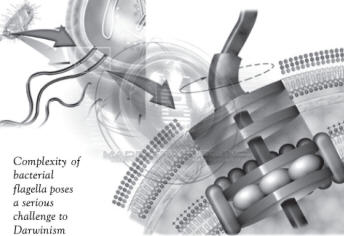For the scie ntist who has lived by his faith in the power of reason , the story [of the big bang] ends like a bad dream. For the past three hundred years, scientists have scaled the mountain of ignorance and as they pull themselves over the final rock, they are greet ed by a band of theologians who h ave been sitt ing th e re for centuri es." admits Astrophys icist Robert Jastrow in his book God and the Astronomers.
This statement reveals a dramatic, indeed historical, development in mode rn science , wherein the scientific temper is calling for inclusion of a spiritual paradigm in science. In this essay we will analyze this amazing trend and then see the avenues that it opens for India to emerge as the spiritua l leader of a post -secular world order.
HISTORY IN THE MAKING – AND REMAKING
Since the time Newton attempted to explain planetary orbits through the laws of gravity and motion, the scientific belief that the totality of existence can be explained through science has been gaining momentum. Correspondingly the hand of God on the canvas of the universe has been becoming dimmer and dimmer.
Prior to Newton , God was understood to be the creator and controller of the universe. Newtonian physics relegated Him to t he role of a creator, a merec10ckmaker who had no power over nature , which was supposed to be governed by impersonal laws. Darwin's Origin of Natural Species proposed in 1859, provided the intell ectual justification for removing God even from the role of the creator. The intell ectual climate of that time embraced Darwinian evolution not so much because of its scientific basis, but because of its ideological implications. This covert agenda to "exile" God from the academic world was made overt by Friedrich N eitzsche through his jolting "God is dead" proclamation. Today almost all the academic textbooks and journals as well as commercial science fictio n novels and movies portray evolution as a proven fact,as an unquestionable scientific reality. Time and time again we get to hear recycled versions of the same old tale of human and universal origins: the universe originated with a big bang, unicellular life evolved fortuitously on the earth in a primordial soup, life forms evolved to increasing levels of complexity, and gradually all the flora and fauna on our planet-including we humans- came about. And concomita ntly t he religious world views of universal origins involving God are almost instantly rejected as pre-scientific superstitions.

This materialistic world view has gained widespread acceptance not so much due to its scientific validation as due to its vigorous propagation . Moreover the impressive technological accomplishments of science-catering to the mass demands for instant relief and pleasure have created among people ananve, unquestioning faith that whatever science says must be true.
But as the harmful effects of technology are being increasingly recognized, so also are the fallacies of the scientific world view that underlies these technologies.
Most people to day have been led to believe that science can explain or will soon explain all n a tural phenomena including the origin of life and the universe. Not many of them get to know that this notion is a modern superstition, a blind belief that is only a few centuries old. Or that it is being increasingly challenged by scientific findings . All over the world, pioneering research in many different fields promises to herald a spiritual revolution within science. Let's briefly see the basis of this call for the respiritualization of science:
1. At the macroscopic level, the 'fine-tuning' of the universethe micro-precise adjustment of almost 80 constants crucial for the formation of the universe has led to the rise of the Intelligent Design Movement, which asserts that the tuning requires a tuner, a super-intelligent being, God, to oversee the creation and maintenance of the universe. "I saw in it (the atom) the key to the deepest secret of nature, and it revealed to me the greatness of the creation and the Creator," This remark of Noble Laureate physicist Max Born has turned out to be more prophetic then what most of his contemporaries could have imagined.
2. In the field of biology, the discovery of systems of irreducible complexity like say the bacterial flagella has posed a serious-possibly irrefutable-challenge to the Darwinian presumption that all life forms evolved gradually through natural processes from simple elements in the primordial soup. That's why Noble Laureate biologist admits, "The origin of life appears at the moment to be almost a miracle, so many are the conditions which would have had to have been satisfied to get it going."
3. The singular failure of scientists to explain consciousness the most funda mental reality of existence in mechanistic terms suggests that consciousness has a nonmaterial or spiritual origin. Renowned physicist Neil Bohr states this, "We can admittedly find nothing in physics or chemistry that has even a remote bearing on consciousness . Yet all of us know that there is such a thing as consciousness, sim
4. The implications of Godel's t heoremthe demonstration that in logic and in mathematics there must be true but unprovable statements, and that the consistency of a system such as arithmetic ca nnot be proved within that system has shaken the foundations of godless rationalism, which thrived earlier on the presumption that we could one day understand the universe in toto. This is revealed by eminent physicist Stephen Hawking, "Maybe it is not possible to formulate the theory of the universe in a finite number of statements … we and our models, are both part of the universe we are describing. Thus a physical theory, is se lf referencing like in Godel's theorem. One might, therefore, expect it to be either inconsistent, or incomplete … All the theories we have at present are both inconsistent and incomplete."
Thus not only are specific scientific theories deficient and defective, but the basic scientific methodology of reductionism is itself inadequate as asserted by eminent brain researcher John Eccles, "I maintain that the human mystery is incredibly demeaned by scientific reductionism, with its claim in promissory materialism to account eventually for all the spiritual world in terms of patterns of neuronal activity. This belief must be classed as a superstition. .. 'We have to recognize that we are spiritual beings with souls existing in a spiritua world as well as material beings with bodies and brains existing in a material world
Indeed eminent thinke rs throughout the world, including leading scientists such as Nobel Laureate Richard R. Ernst, peace workers such as Nobel Laureates Oscar Arias Sanchez and Betty Williams, and spiritualists such as Nobel Laureate the Dalai Lama, firmly believe that only a synthesis of science and spirituality can lead the world out of the present troubled times.
ANCIENT INDIA'S INTEGRATED APPROACH TO SCIENCE AND SPIRITUALITY:

India is renowned globally as the land of profound and peerless spiritual wisdom. Lesser known are the accomplishments and contributions of India to the field of science. Here are a few quotes from famous Western scientists acknowledging the scientific glory of Vedic India:
1. "We owe a lot to the Indians, who taught us how to count, without which no worthwhile scientific discovery could have been made." (Albert Einstein)
2. "After the conversations about Indian philosophy, some of the ideas of Quantum Physics that had seemed so crazy suddenly made muc h more sense" – (Noble Laureate W. Heisenberg, pioneer of quantum physics)
3. "The Vedanta and the Sankhya hold the key to the laws of mind and thought process which are co-related to the Quantum Field , i.e. the operation and distribution of particles at atomic and molecular levels." – (Prof. Brian David Josephson (1940 – ) Welsh physicist, the youngest Nobel Laureate)
idam hi pumsas tapasah srutasya va svistasya suktasya ca buddhi-dattayoh avicyuto 'rthah "It is India t hat gave us the ingenious method of expressing all numbers by ten symbols, each receiving a value of position as well as an absolute value, a profound J and important idea which appears so simple to us now that we ignore its true merit. But its very simplicity, the great ease which it has lent to all computations, puts our arithmetic in the first rank of useful inventions' and we shall appreciate the grandeur of this achievement the more when we remember that it escaped the genius of Archimedes and Appollnius, two of the greatest men produced by antiquity." (Pierre Simon de Laplace, French mathematician, philosopher, and astronomer)
Whether Vedic science equalsand sometimes even surpasses the sophistication of modern science is a debatable subject, but what is beyond debate and what makes it truly unique is its highly theistic approach. And this is why Vedic science becomes crucially important for modern humanity-because it has the potential to bridge the yawning chasm that separates science and spirituality today. Indeed, by uniting reason and faith in a higher-dimensional paradigm, it can heal the wound that has torn the human brain and the human heart far apart.
In the Vedic paradigm, science had a spiritual purpose. This is vividly stated In the Srimad Bhagavatam (1.5.22)
idam hi pumsas tapasah srutasya va
svistasya suktasya ca buddhi-dattayoh
avicyuto 'rthah kavibhir nirupito
yad-uttamasloka-gunanuvarnanam
svistasya suktasya ca buddhi-dattayoh
avicyuto 'rthah kavibhir nirupito
yad-uttamasloka-gunanuvarnanam
"Learned circles have positively concluded that the infallible purpose of the advancement of knowledge, namely austerities, study of the Vedas, sacrifice, chanting of hymns and charity, culminates in the transcendental descriptions of the Lord, who is defined in choice poetry."
In his purport Srila Prabhupada states: "Science and philosophy also should be applied in the service of the Lord. There is no use presenting dry speculative theories for sense gratification. Philosophy and science should be engaged to establish the glory of the Lord. Advanced people are eager to understand the Absolute Truth through the medium of science, and therefore a great scientist should endeavor to prove the existence of the Lord on a scientific basis ."

Thus, science the human faculty to observe and infer a rational understanding from the observation can be used to verify and confirm spiritual truths such as the omnipotence and superintelligence of God. This spiritual outlook to science in particular and life in general can rectify much of the exploitative and destructive use to which science is currently being put. In fact, many of the early Western scientists had a similar spiritual purpose for their scientific investigations.
Eminent mathematician Johannes Kepler says, "I have endeavored to gain for human reason, a ided by geometrical calculation, an insight into His way of creation; may the creator of the heavens themselves, the father of all reason, to whom our mortal senses owe their existence, may He who is Himself immortal. .. keep me in His grace and guard me from reporting anything about His work which cannot be justified before His magnificence or which may misguide our powers of reason, and may He cause us to aspire to the perfection of His works of creation by the dedication of OUf lives … "
Vedic thought considers not only science as a spiritual quest, but even spirituality as a scientific pursuit. The Vedic texts explain that genuine spirituality is meant to awaken the soul to his original spiritual identity as a harmonious unit in the supreme sp iritual whole. This is affected through a harmonious combination of philosophy and reo ligion, which constitute the two rails on which spirituality runs. The philosophy aspect of spirituality involves the study and understanding of matter, spirit, and the controller of both-the Supreme. And the religion aspect involves the following of certain rules and regulations' which bring about the actual realization and experience of the spiritual realm.
The striking similarity of this understanding of spirituality with the approach of modern science to study the cosmos is worth noting. Modern science involves the formulation of hypotheses to explain the observable phenomena within the universe (similar to the philosophy aspect of spirituality). And it also involves the following of certain rules, which regulate the laboratory environment in a way by which the validity of the hypotheses can be verified (similar to the religion aspect of spirituality). Spirituality thus constitutes a high er dimensional science, in that it deals with realms of reality high er th an the mundane.
The spiritual scientist , by dint of systematic practice of both philosophy and religion , realizes t he actual n ature of the cosmos and learns to live in harmony with it. Having realized his own identity as an eternal spiritua l being and his loving relationship with the Supreme being, such a realized spiritual scien tist sees all living beings as his own broth e rs. His vision of unive rsal b rotherhood precipitates him to sponta neous, selfless, and spiritual service towards all living beings.
SPIRITUAL GLORY BECKONS MODERN INDIA:
We modern India ns h ave inherited an unparalleled legacy of spiritual and scientific knowledge. But unfortunately most India n s a re unaware of their glorious legacy and so are disillusioned with Indian religion and en amoured by Western t echnology. S ince independence, India has made steady strides in scientific progress in weaponry, space research , and of cOurse softwa re engineering. Alth ough much more can be done to provide basic amenities to the underprivileged, there is an even more urgent need.
As far as technological advancement is concerned, we can keep improving our gadgets for a long time to come. But we need to ask a vital question: Is that what the world needs today? Despite the best comforts, millions of people today are suffering from dep ression , stress, hyperten sion, addiction , and suic id al urges. The techno logically super-advanced West is turning to the East for spiritual solace, as is evident from the increasing popularity o f meditation, yoga and chanting. And this is wh ere India can contribute like no orher country in the world. Because of our spiritual culture and scientific education, we Indians can have scientific temper in our brains and spiritual wisdom in our hearts in a way that would be impossible for anyone else in any other part of the world. Thus we are best suited to bring about the much-needed synthesis of science a nd spirituality that thinkers all over the world are searching for. That's why Srila Prabhupada would lament, "Modern Indians are sitting on jewels and begging for glass." And he asserted unequivocally that spiritual harmony is indispensable for human happiness. "When th e scientist, the philosopher and the medical man get the opportunity to study scientifically what is God .. .. , then there will be paradise on the earth."
– Caitanya Carana Dasa is a disci ple of His Holiness Radhanatha Swami. He holds a degree in electronics and telecommunications engineering and serves full -time at ISKCON Pune. His free cyber magazine, The Spiritual Scientist , gives a scientific presentation of Krsna consciousness .
